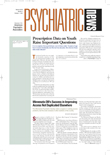Cholinesterase inhibitors, long considered the primary treatment for the cognitive symptoms of Alzheimer’s disease, may also improve neuropsychiatric and functional outcomes, according to new research. Researchers believe these improvements may translate into tangible increases in quality of life, including a delay in institutionalization, and help to ease caregiver burden.
In a systematic review and meta-analysis of clinical trials involving cholinesterase inhibitors, Kristine Yaffe, M.D., an assistant professor in residence of psychiatry at the University of California at San Francisco and the San Francisco Veterans Affairs Medical Center, and her colleagues collected data from 29 clinical trials involving the drugs. They focused on those that evaluated not only cognitive decline, but also some aspect of neuropsychiatric or functional outcomes. Of the 29 trials, 16 included measures of patients’ neuropsychiatric symptoms, while 18 included data on functional outcomes. The study, funded by the U.S. Public Health Service, was published in the January 8 issue of the Journal of the American Medical Association.
Previous research has shown that the vast majority of Alzheimer’s patients exhibit at least some neuropsychiatric symptoms as their disease progresses. As many as 80 percent of patients can be expected to experience hallucinations, paranoia, agitation, or affective disturbances during the course of their illness.
While functional impairment is an integral part of the progression of the disease, treatment research has traditionally focused on reducing the rate of cognitive decline in Alzheimer’s patients, and clinical treatment has been focused on the use of cholinesterase inhibitors to achieve this therapeutic goal.
Yaffe and her colleagues searched MEDLINE, Dissertation Abstracts On-Line, PSYCHINFO, BIOSIS, PubMed, and the Cochrane Controlled Trials Register for any clinical trials using cholinesterase inhibitors in the treatment of dementia or, more specifically, Alzheimer’s. For their meta-analysis, they included only trials that were randomized, double blind, and placebo controlled with either a parallel or crossover design.
Trials had to include at least one month of treatment with one of the following cholinesterase inhibitors: donepezil (Aricept), galantamine (Reminyl), rivastigmine (Exelon), and tacrine (Cognex). In addition, the researchers looked at trials using four cholinesterase inhibitors not approved for marketing in the United States, but are either investigational or available in other countries: eptastigmine, metrifonate, physostigmine, and velnacrine.
Neuropsychiatric outcomes were measured using the noncognitive portion of the Alzheimer Disease Assessment Scale (ADAS-noncog) or the Neuropsychiatric Inventory, and functional outcomes were measured on a validated assessment of basic activities of daily living (ADLs) and instrumental activities of daily living (IADLs).
Of the 16 trials assessing neuropsychiatric symptoms, 14 indicated that patients who received cholinesterase inhibitors benefited from them, seeing a reduction in their symptoms. Two trials indicated no benefit from use of the medications versus placebo. In the meta-analysis of all 16 trials, patients receiving cholinesterase inhibitors saw a small but statistically significant improvement over placebo.
As for the 14 trials assessing functional outcomes, summary meta-analysis of those trials assessing ADLs (such as feeding and dressing) indicated that patients who received cholinesterase inhibitors had statistically significant improvement versus patients taking placebo. For the 13 trials that included IADL outcomes, patients taking a cholinesterase inhibitor improved significantly more compared with those taking placebo. The ADL and IADL improvements were characterized by Yaffe and her co-authors as “small but statistically significant.”
The researchers concluded that their “results support the hypothesis that [cholinesterase inhibitors] have a modest beneficial role in treating neuropsychiatric symptoms and reducing functional impairment in patients [who have] mild to moderate Alzheimer’s and who are living in the community.”
Yaffe and her colleagues also noted that “each of the [drugs] had similar beneficial effects.”
The authors called for more research into functional and neuropsychiatric outcomes in patients with Alzheimer’s who are taking cholinesterase inhibitors. “Exploring these issues will possibly broaden treatment for Alzheimer’s, an illness with growing importance to public health.”
JAMA 2003 289 210
